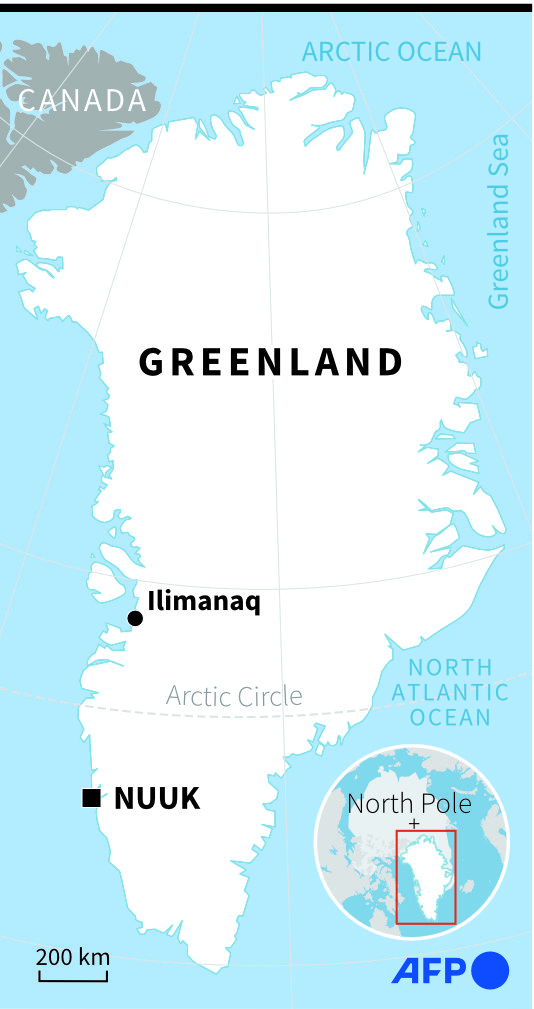COPENHAGEN: Denmark’s prime minister said Thursday she had reached out to US President-elect Donald Trump following his remarks about taking control of Greenland, which Denmark said were being taken seriously.
Trump, who takes office on January 20, set off alarm bells on Tuesday when he refused to rule out military intervention to bring the Panama Canal and Greenland under US control.
Denmark has said it is open to talks on US interests in the Arctic, but the prime minister has insisted that “Greenland belongs to the Greenlanders.”
European leaders have also supported the sovereignty of the Arctic island that is an autonomous Danish territory. Russia has voiced concern for maintaining peace and stability in the region.
Danish Prime Minister Mette Frederiksen summoned leaders of the parties in Denmark’s parliament, including Greenland’s two representatives, to a meeting Thursday to brief them on the government handling of events.

Danish Prime Minister Mette Frederiksen (C), Defense Minister Troels Lund Poulsen (L) and Foreign Minister Lars Loekke Rasmussen give a press conference in Copenhagen on January 9, 2025, following a meeting with party leaders regarding Greenland. (Ritzau Scanpix / AFP)
Few details emerged from the two-hour talks, but Frederiksen told reporters after that her office had reached out to Trump though the two had not spoken yet.
“We have proposed a conversation between us. I don’t think anything concrete will happen until the president-elected is installed,” she said.
She reiterated that she did not believe Trump would try to seize Greenland by force.
“We have no reason to believe that would happen.”
The head of the right-wing Danish People’s Party, Morten Messerschmidt, told TV2 television after the talks he was “completely confident that the (Danish) government wants to work closely with the United States... our most important economic and defense political allies.”
But another right-wing populist leader, Inger Stojberg of the Denmark Democrats, said her impression was that the government had “no concrete plan” and appeared “paralyzed.”
“I hope the government will be more active toward Trump when he takes office,” she said.
One of the Greenland representatives, Aki-Mathilda Hoegh-Dam, praised Frederiksen for a “good dialogue.”
“I think it’s important to keep a cool head and remember that we have... a good partnership and this doesn’t change that,” she said.

Greenland's Prime Minister Mute B. Egede attends a New Year's Reception at the Greenlandic Representation in Copenhagen on January 9, 2025. (Ritzau Scanpix / AFP)
Before the talks, Foreign Minister Lars Lokke Rasmussen told reporters that Denmark has “no ambition whatsoever to escalate a war of words with a president on his way into the Oval Office.”
“My own attitude is that you should take Trump very seriously but not necessarily literally. We take it so seriously that we are also working on it,” he added.
Italian Prime Minister Giorgia Meloni also dismissed speculation the United States might use force to take Greenland.
“I feel like I can rule out that the United States in the coming years will try to forcefully annex territories that interest them,” Meloni told a press conference in Rome.
She said Trump’s remarks were “more of a message to... other big global players.”
Rivalry between the Uniited States, China and Russia is growing in the Arctic, as ice melts due to climate change and opens up new shipping lanes.

Illustration map of Greenland. (AFP)
In addition to its strategic location, Greenland, which is seeking independence from Denmark, holds massive untapped mineral and oil reserves, although oil and uranium exploration are banned.
The United States has a military base in northwest Greenland.
Trump first said he wanted to buy Greenland in 2019 during his first term as president, an offer swiftly rebuffed by Greenland and Denmark.
German Chancellor Olaf Scholz insisted that “borders must not be moved by force. This principle applies to every country, whether in the East or the West.”
Kremlin spokesman Dmitry Peskov on Thursday said Russia was following events “very closely.”
“We are interested in preserving peace and stability in this zone and are ready to co-operate with any parties for this peace and stability,” he added.
Greenland’s Prime Minister Mute Egede, speaking in Copenhagen on Thursday, said the territory was “entering a new era, in a new year where Greenland is in the center of the world.”
In a statement Wednesday, the government said “Greenland’s development and future are decided solely by its people.”
At the same time, it said it would continue to cooperate with the United States “as one of our closest partners.”
“Greenland has had more than 80 years of defense cooperation with the US for the benefit of the security of Greenland, the US and the rest of the Western world,” it said.
























